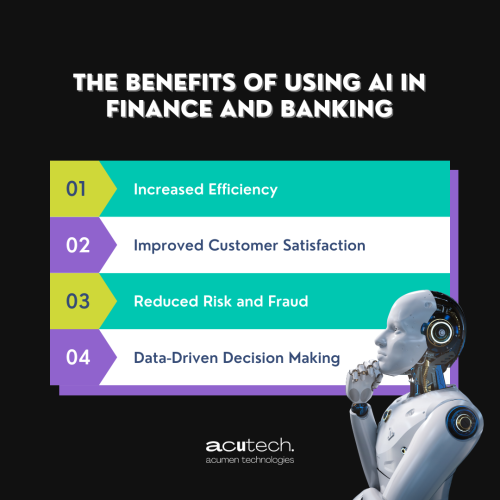Artificial Intelligence is emerging as a transformative force in the banking and finance sector. It represents a significant paradigm shift in how financial services operate and interact with customers. Integrating AI in finance services is not merely a trend; it is a firm response to the growing demand for smarter, more efficient, and customer-centric solutions.
According to NVIDIA’s fourth annual State of AI in Financial Services Report for 2024, 91% of financial services companies are either assessing AI or already using it. This widespread adoption highlights AI’s potential to revolutionize the industry, from enhancing operational efficiency and customer experience to improving risk management.
However, it also brings concerns about job displacement, data privacy, and the ethical considerations surrounding AI algorithms.
How AI is Reshaping Financial Services
The integration of AI into financial services is a profound transformation, reshaping the industry at its core. From enhancing customer interactions to streamlining operations and managing risks, AI redefines what is possible in banking and finance.
Enhancing Customer Experience with AI
The advent of conversational AI, including chatbots and virtual assistants, marks a significant leap in customer service. These AI-driven tools are not only responsive but also predictive, providing personalized advice and support around the clock.
For instance, Bank of America’s virtual financial assistant, Erica, has interacted with clients over 1.5 billion times since its launch in 2018, showcasing AI’s powerful potential in enhancing customer engagement. Additionally, AI-powered financial tools and budgeting apps have revolutionized personal finance management, offering users detailed insights into their spending habits and financial health.
Streamlining Operations and Improving Efficiency
AI’s role in automating routine and complex tasks, such as loan processing and fraud detection, has significantly reduced processing times and minimized human errors. A study by McKinsey estimated that AI technologies could potentially deliver up to $1 trillion annually in additional value for global banking. By analyzing vast datasets, AI not only enhances operational efficiencies but also enables financial institutions to tailor their services to individual customer needs.
Risk Management and Fraud Detection
In risk management and fraud detection, machine learning algorithms stand out for their ability to sift through vast amounts of transaction data in real time, identifying patterns indicative of fraudulent activity. This capability is crucial in a financial landscape where cyber threats are becoming increasingly sophisticated.
For example, J.P. Morgan uses AI-powered large language models for payment validation screening, resulting in lower levels of fraud and improved customer experience. AI’s application in credit risk assessment has also transformed the loan approval process, making it faster and more accurate by evaluating a broader spectrum of data points.
Personalized Financial Advice and Products
The rise of AI-powered investment platforms and robo-advisors illustrates the growing demand for personalized financial advice. These platforms leverage algorithms to provide investment recommendations tailored to an individual’s risk tolerance and financial goals.
AI-powered robo-advisers, such as Betterment and Vanguard in the US and finance app Revolut in Europe, democratize access to investment advice. Furthermore, AI’s ability to analyze personal financial data enables institutions to offer customized financial products, ensuring that offerings are aligned with customers’ unique needs.
The Benefits of Using AI in Finance and Banking
The emergence of AI in the financial sector has catalyzed profound transformations, predicting a new era of efficiency, customer satisfaction, and security. AI’s benefits in finance are extensive, reflecting a deep integration of technology into the industry’s core operations and customer interactions.
Increased Efficiency
AI’s capacity to automate routine and complex processes has significantly improved operational efficiency and productivity across the financial services sector. For instance, J.P. Morgan’s COIN platform uses machine learning to interpret commercial loan agreements, a process previously consumed 360,000 hours of work yearly by lawyers and loan officers. Now, it can be completed in seconds. This dramatic reduction in processing time accelerates decision-making, allowing human employees to focus on more strategic and creative tasks.
Improved Customer Satisfaction
By personalizing the customer experience through AI-driven insights and interactions, financial institutions can meet and exceed the expectations of digitally savvy clients. Personalized financial advice, instant customer service through chatbots, and predictive customer needs analysis contribute to a more engaging and satisfying customer experience. This customized approach enhances customer satisfaction and fosters loyalty.
Reduced Risk and Fraud
Applying machine learning algorithms to detect fraudulent activities and assess risks has significantly bolstered the security of financial transactions.
By analyzing patterns and behaviors in vast datasets, AI systems can identify anomalies that signal potential fraud, often before it occurs. For example, Visa’s AI-driven Advanced Authorization technology analyzes over 500 unique risk attributes, contributing to a 30% reduction in fraud. Similarly, in the credit risk area, AI models leverage a wider array of data points to make more accurate predictions about borrowers’ ability to repay loans.
Data-Driven Decision Making
AI’s ability to process and analyze large volumes of data has revolutionized decision-making within the financial sector. Insights from AI algorithms enable financial institutions to develop more effective strategies, design better products, and deliver more relevant services. This data-driven approach ensures that financial products are aligned with customer needs and responsive to market dynamics.

Leading the Way in AI Integration
AI in finance has evolved into a transformative force that reshapes the landscape of banking and investing. By leveraging AI, financial institutions can achieve unprecedented levels of efficiency, customer satisfaction, and security. As the industry continues to evolve, embracing AI will be crucial for staying competitive and meeting the ever-growing demands of the digital age.
We understand the transformative power of AI in finance. Our cutting-edge solutions and expert know-how enable financial institutions to harness the full potential of AI. We help our clients enhance operational efficiency, improve customer satisfaction, and secure financial transactions through innovative AI technologies.
Ready to transform your financial services with AI? Contact us and let’s discover together how our solutions can help you stay ahead.


